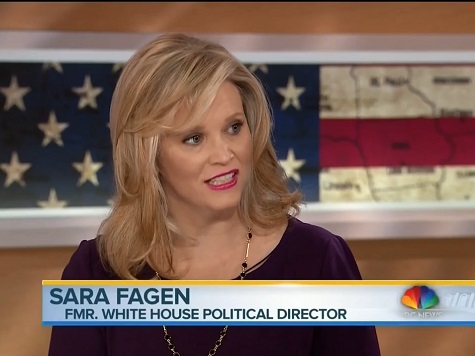On Sunday’s broadcast of NBC’s “Meet the Press” during the panel segment, moderator Chuck Todd asked the question if the Ebola outbreak was fair game as a political issue or if it was irresponsible to be used in the upcoming midterm elections.
Todd’s panel, which included former White House political director and DDC Advocacy partner Sara Fagen, former White House press secretary and NBC contributor Robert Gibbs, former NBC “Nightly News” anchor Tom Brokaw and New York Times correspondent Helene Cooper seemed unanimous in their condemnation of Ebola being used as a political.
Fagen called it not just irresponsible, but wrong as well.
“It can be irresponsible. And this Ebola outbreak is a serious national security issue that particularly political-elected leaders need to think very carefully before they make statements like that,” she said. “I think it’s irresponsible. I would take it a step further, which is to say it’s also wrong. Sure, the United States government should take precautionary measures at our borders. But unless you’re planning on eliminating all flights into the United States, you cannot contain the risk of the spread of Ebola. I mean, think about it. You’re going to build a wall in Mexico but then people are going to fly all over the globe?”
Partial transcript as follows:
TODD: We know the saying, “It’s all fair in politics.” But as you just say, there are politicians aren’t being shy about pushing the panic button as the midterms approach. Our panel is back to discuss. Sara Fagen, Robert Gibbs, you guys are campaign advisors. I understand the politics of fear can be good politics, but it can be irresponsible.
FAGEN: It can be irresponsible. And this Ebola outbreak is a serious national security issue that particularly political-elected leaders need to think very carefully before they make statements like that.
TODD: I was just going to say, you think that making statements about, “Oh my God, Ebola can come across the border through Mexico,” is a little bit irresponsible?
FAGEN: I think it’s irresponsible. I would take it a step further, which is to say it’s also wrong. Sure, the United States government should take precautionary measures at our borders. But unless you’re planning on eliminating all flights into the United States, you cannot contain the risk of the spread of Ebola. I mean, think about it. You’re going to build a wall in Mexico but then people are going to fly all over the globe?
TODD: You build a wall and a bubble right now.
SARA FAGEN: Right.
TODD: You know, Robert, one of the reasons where I think Republicans are going to this issue is they want to keep nationalizing the elections. The more nationalized they are, the better for Republicans. Do you buy that?
GIBBS: Well, I think so. And we see that the inconvenience of having an election during a public health emergency gives you the types of–
TODD: You call it an inconvenience. Is that–
GIBBS: Well, I’m being horribly sarcastic there. I think the notion, look, we’ve got to be careful. Everybody has to be careful about what we say to enter that into the political sphere is potentially a mess. And I think quite frankly, it has the real chance of turning off independent or voters that haven’t made up their minds are going to look at these candidates and say, “That’s just crazy.” And I think that could help somebody else other than the Republican in that race.
TODD: You know, Tom, one of the reasons why I think politicians have felt so comfortable playing the sphere card is the media’s gone right in.
BROKAW: They have. I mean, and–
TODD: We say “they.” You know, we can’t be too dispassionate.
BROKAW: I just said to one of our producers the other day. I said, “Look, if you had a false Ebola scare in a Super 8 in Dallas, you’d give it three minutes.” And the fact is, it doesn’t deserve three mistake. We need to get clarity in what we’re dealing with here about how it’s transmitted. Are the emergency rooms prepared to deal with patients who walk in with these symptoms of it?
Many of them are not. President Obama, to his credit, has put it on his agenda. The health care system in this country is beginning to respond very quickly with our national CDCs and others as well. They’re very aware of what’s going on. What Helene did was a great service. Going into West Africa and telling people what it’s like when you get there. So this is a national unifying issue that ought not be a partisan issue. This is something that affects everybody here and we need to deal with it now.
TODD: You know, and Helene, you were talking about the protective clothing issue. And it was something you’ve been sort of chomping at the bit to explain. Here is how protective clothing could actually be a problem. Explain.
COOPER: Well, I don’t think that, I was looking at this Texas case that we now have, the second Texas case. And the reports say that this Texas healthcare worker was wearing protective clothing. And I think it’s just important to remember that one of the things about protective clothing is that you have to be very careful with how you take it off.
You know, it’s not as if you’re wearing Hazmat gear to go into a room and you come out, you’re safe. When you’re taking it off, you have to make sure that you bleach and chlorinate yourself and you’re not touching it. And so I just think that we need to be rational about how we discuss this.
Follow Jeff Poor on Twitter @jeff_poor

COMMENTS
Please let us know if you're having issues with commenting.